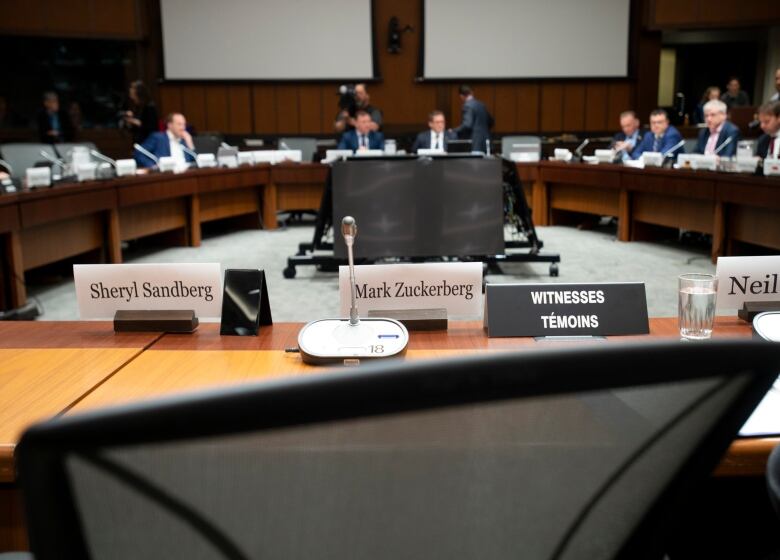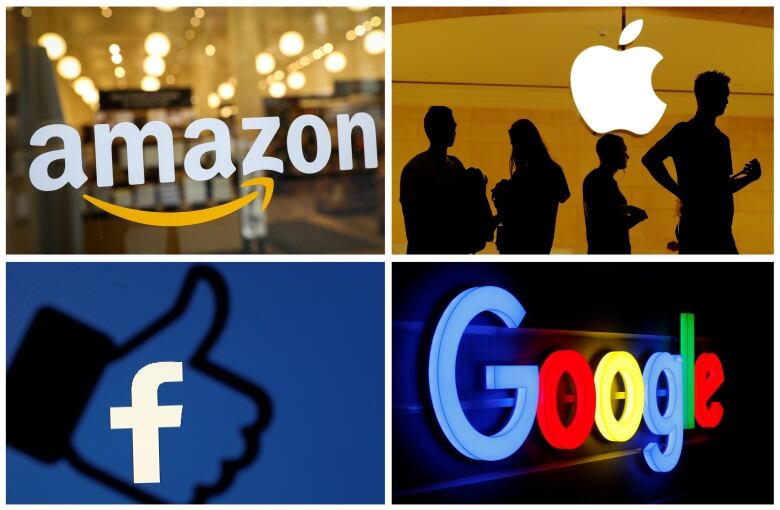Why we can never put the Big Tech monster back in its box: Don Pittis
Facebook, Google and the rest have changed the world and Congress can't reverse it

It's as ifGodzilla hatched from its giant radioactiveegg, while we all watched complacently,and then grewinto a civilization-eating monstrosity.
And now thatthe Big Four tech giants Facebook, Google, Amazon and Apple have suddenly gobbled up whole industries, stomping through the smoking ruins of the advertising,retail, music and news industries, the world's politicians are trying to turn the clock back.
Empty seats behind nameplates for Facebook executives Mark Zuckerberg andSheryl Sandbergduring recent hearings in Ottawa were a glaring demonstration that CanadianParliament even when backed by the support of international lawmakersdoes not have the firepower to blast thisdigital economy Godzilla into submission.
But even as politicians from both sides of Congress gang up this week, it is almost impossible to imagine eventhe full might of the U.S. government can do much to subdue industriesbuiltin aninterconnected age ones that arestill growing and transforming in unpredictable ways.
"The current landscape suggests there are only one or two significant players in important digital spaces, including internet search, social networks, mobile and desktop operatingsystems, and electronic booksales," the head of the U.S. Department of Justice's antitrust division,Makan Delrahim, said in a speech this week, titled Antitrust Enforcement and Digital Gatekeepers.
Cheap or free but still a monopoly
In economics, the main concern about monopolies is thatthey are able to charge higher prices than in a competitive marketplace, as consumers have no alternative to that single supplier.
But in his comprehensive address, the Justice Department's antitrust chief pointed out that monopoly power is not all about price. Amazon, for example, may offer the cheapest prices and still be a monopoly. Google or Facebook may offer services for free, thereby prevent others from competing.
"As we think about antitrust enforcement in the digital economy, the key issues that antitrust enforcers must untangle are whether a company is growing due to superior price, qualityand innovation, or whether some transaction or business practice is, on balance, anti-competitive in purpose and effect," saidDelrahim.

In theory, charging the lowestprices can lead to the bankruptcy of the competition, allowing the market leader to raise prices later. But domination of an entire technological platformcan be even more insidious, preventingsmall-fry competitors from presenting their own innovations to the worldespecially when the giants quickly gobble up innovativechallengers through acquisition.
And while the U.S. government celebrates its successes in breaking up theStandard Oil monopoly in 1911, the AT&T telephone monopoly in the '70s and, more recently, Microsoft's dominance of the PC market through Internet Explorer, it has failed to prevent the systemic domination by the "digital gatekeepers" of long-established industries at the heart of business and society.

The once-profitable recording industry, decimated first by illegal file-sharing and then by Apple's iTunes, is now subject to the power of Big Tech's streaming services.
It is also too late for much of the newspaper industry, with many formerly strong outlets forced to close down or to cuteditorial staff to the bone,as the advertising dollarsused to invest inquality journalism moved to these dominant online platforms.
In wiping out the news industry, digital gatekeepers "have operated with virtual immunity from the antitrust laws,"said Rep.David Cicilline, of Rhode Island,as the congressional antitrust hearings began this week.
Buteven if Congress moves quickly, it is hard to imagine the newsindustry returning to its former health and powereven if Facebook and Google were forced to more fairly share their advertising revenuewith content creators, as many have proposed.
Hard to solve
In its quest to eliminate the digital gatekeeper monopolies, Congress may face a number of insurmountable problems.
One is the speed with which technologytransforms. Any new rules by the plodding legislative and judicial process could fail to catch up with an industrythat has already moved on.
A related problem is the complexity created by digital connectedness. Problems like security and privacy, high on the congressional agenda, are not something that can be solved once and for good.
In a world where the Phoenix pay system cannot print an accurate cheque after years of trying, governments may be fearful of breaking up powerful companies that are able to do things right.
And unlike in previous antitrust actions, another snag is thatglobal tech giants are no longer under the purviewof any single government. Global competitors, especially from China and especially in the current hostile trade climate, are outside congressional control.
But far more important than those may bethe fact that a globalized digital technology has already transformed not just industry, but our entire society in ways that simply cannot be undone.
Beyond economics, social and civil discourse have been changed forever:Instant information inyour pocket. The ability to share your views with a wide audience. The ability to try to manipulate the political dialogue for good or for ill.
In economics, there is the concept of the "natural monopoly" a business that, without any attempt at collusion, dominates an entire sector.
When we have access to the whole world, instead of choosing variety, we may all prefer to narrow our choices.
With our urge to watch the same team play, to shop in the most convenient way,to stream the most popular videos, read the hottest news andtalk in the forums where all of our friends are talking too,it may be that we've all contributed to creatinga monster that will be hard even for Congress to kill.
Follow Don on Twitter @don_pittis












_(720p).jpg)


 OFFICIAL HD MUSIC VIDEO.jpg)
.jpg)



























































































